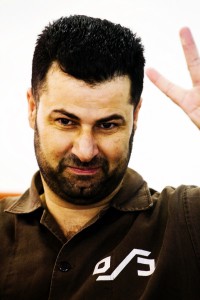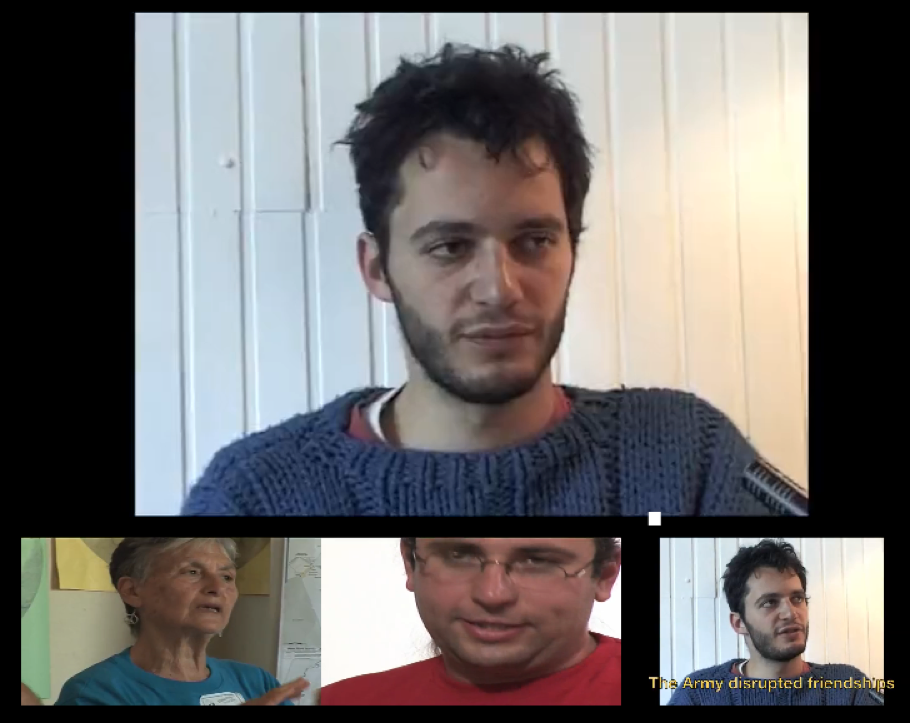The Only Democracy? » Human Rights Activists in the Crosshairs » Abdallah Abu Rahmah gets one year in prison despite international outcry
Abdallah Abu Rahmah gets one year in prison despite international outcry
Bil’in protest organizer Abdallah Abu Rahmah was sentenced to 12 months imprisonment today, for his involvement in his village’s unarmed struggle against the wall.
Abdallah Abu Rahmah was sentenced today to 12 months in prison, plus 6 months suspended sentence for 3 years and a fine of 5,000 NIS. In the sentencing, the judge cited the non-implementation of an Israeli High Court ruling which declared the current route of the wall on Bil’in’s land illegal as a mitigating factor.
The military prosecution is likely to appeal this sentencing – as they did in the case of Adeeb Abu Rahmah, who was also sentenced for 12 months on similar charges but is still in prison after 15 months, pending the decision about the prosecution’s appeal. The defense attorney, adv. Gaby Lasky, is considering an appeal against Abu Rahma’s conviction.
Today’s sentencing hearing was attended by diplomats from the United Kingdom, the European Union, Belgium, Germany along with representatives of UNSCO and Human Rights Watch.
“The Israeli army, which served as prosecutor, judge and jury in this case, is try to use Abu Rahmah to set an example that will deter people from protesting. They have even said so themselves”, said Mohammed Khatib of the Popular Struggle Coordination Committee. “Their message falls on deaf ears, as we have no choice but to continue struggling for our lands, our freedom and our dignity”, he added.
Click here for the sentencing decision (in Hebrew).
Background
Abu Rahmah, the coordinator of the Bil’in Popular Committee Against the Wall and Settlements, was arrested last year by soldiers who raided his home at the middle of the night and was subsequently indicted before an Israeli military court on unsubstantiated charges that included stone-throwing and arms possession. Abu Rahmah was cleared of both the stone-throwing and arms possession charges, but convicted of organizing illegal demonstrations and incitement.
An exemplary case of mal-use of the Israeli military legal system in the West Bank for the purpose of silencing legitimate political dissent, Abu Rahmah’s conviction was subject to harsh international criticism. The EU foreign policy chief, Catherine Ashton, expressed her deep concern “that the possible imprisonment of Mr Abu Rahma is intended to prevent him and other Palestinians from exercising their legitimate right to protest[…]”, after EU diplomats attended all hearings in Abu Rahmah’s case. Ashton’s statement was followed by one from the Spanish Parliament.
Renowned South African human right activist, Archbishop Desmond Tutu, called on Israel to overturn Abu Rahmah’s conviction on behalf of the Elders, a group of international public figures noted as elder statesmen, peace activists, and human rights advocates, brought together by Nelson Mandela. Members of the Elders, including Tutu, have met with Abu Rahmah on their visit to Bil’in prior to his arrest.
International human rights organizations Amnesty International condemned Abu Rahmah’s conviction as an assault on the right to freedom of expression. Human Rights Watch denounced the conviction, pronouncing the whole process “an unfair trial”.
Legal Background
Abu Rahmah, the coordinator of the Bil’in Popular Committee Against the Wall and Settlements, was acquitted of two out of the four charges brought against him in the indictment – stone-throwing and a ridiculous and vindictive arms possession charge. According to the indictment, Abu Rahmah collected used tear-gas projectiles and bullet cases shot at demonstrators, with the intention of exhibiting them to show the violence used against demonstrators. This absurd charge is a clear example of how eager the military prosecution is to use legal procedures as a tool to silence and smear unarmed dissent.
The court did, however, find Abu Rahmah guilty of two of the most draconian anti-free speech articles in military legislation: incitement, and organizing and participating in illegal demonstrations. It did so based only on testimonies of minors who were arrested in the middle of the night and denied their right to legal counsel, and despite acknowledging significant ills in their questioning.
The court was also undeterred by the fact that the prosecution failed to provide any concrete evidence implicating Abu Rahmah in any way, despite the fact that all demonstrations in Bil’in are systematically filmed by the army.
Under military law, incitement is defined as “The attempt, verbally or otherwise, to influence public opinion in the Area in a way that may disturb the public peace or public order” (section 7(a) of the Order Concerning Prohibition of Activities of Incitement and Hostile Propaganda (no.101), 1967), and carries a 10 years maximal sentence.
Filed under: Human Rights Activists in the Crosshairs · Tags: Abdallah Abu Rahmah, Bi'lin, unfair trials









 “You have a choice! Israeli Anti-Militarists Speak”
“You have a choice! Israeli Anti-Militarists Speak”